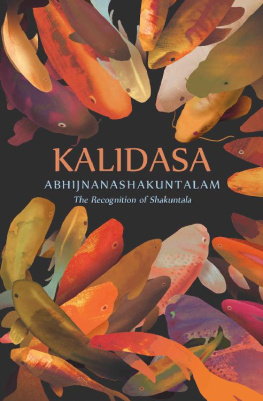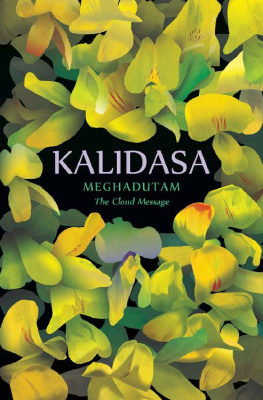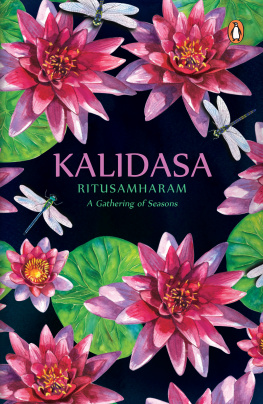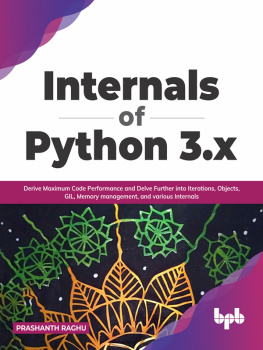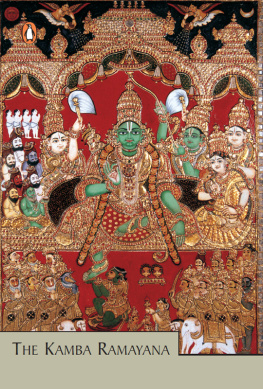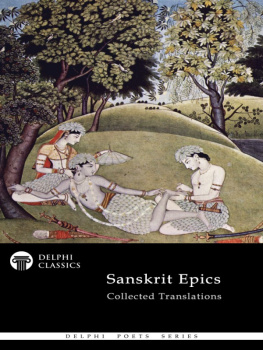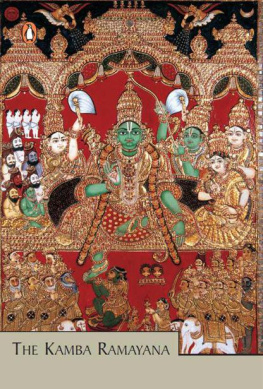P.M.S.
Introduction
This is a new translation of Kalidasas epic poem
Raghuvamsam. Both are well-known names, one in classical Sanskrit and the other also in world literature. Before any comment on the celebrated work, it is only fitting that one begin with some words about its renowned author. Little is known with certainty about Kalidasa apart from his classic creations.
His dates lie between 170 BCE, the approximate time of the Sunga king Agnimitra, who figures in one of his plays, and the 634 CE inscription of the Chalukya king Pulakesin II, at Aihole in southern India, which extolls him by name. Recent scholarship has placed him in the fourth to fifth century CE at the height of the Gupta Empire in a peak period of ancient Indias courtly culture. Nothing is known of his life or person, though there are some picturesque but contradictory legends. Seven of his works are extantthree plays, two epic and two lyrical poems ()making him, at present, the most acclaimed poet and dramatist in Sanskrit literature as well as an established figure in the wider world of letters. Kalidasas global standing has a history of a little over two centuries. It commenced with the first translation of his work into English, that of the play Shakuntalam by Sir William Jones in 1789, and the effusive welcome it received from Goethe, Herder, Schiller and other prominent European figures of the time.
Thereafter his repute spread steadily with the continued growth of Western interest in Indias ancient language and culture, and further translations of his writings into other tongues. By the time of the first English literary rendition of Raghuvamsam in 1902, he had been recognized, in the words of its translator, the British civil servant and Oxford Sanskrit scholar De Lacey Johnstone, as Indias greatest dramatist and the greatest epic poet of her classical days (). Within India, Kalidasas literary standing has always been high, as is evident from the words of many eminent commentators who lived at different times and places. In the north of the country, Bana, another famous writer in Sanskrit from the seventh century, praised him effusively in a well- known verse: Who would not delighted be when Kalidasas well said words, come forth, charming with sweet scents, like flower buds in nectar soaked? () In the south, almost a thousand years later, a distinguished commentator from the Vijayanagara empire lauded him in an often quoted epigram, here translated: In the count of ancient poets Kalidasa does at the first place stay; for the lack of one comparable, the next is nameless to this day. () Nearer our own times, just over a century ago, the poet Rabindranath Tagore was inspired by Kalidasas lyrical poem to write: Ah, supreme poet, that first, hallowed day Of Asarh on which, in some unknown year, you wrote Your Meghaduta! Your stanzas are themselves Like dark layered sonorous clouds, heaping the misery Of all separated lovers throughout the world Into thunderous music. () And more recently, the philosopher and Sanskrit scholar S.
Radhakrishnan, later the President of India, hailed him in these words: Kalidasa is the great representative of Indias spirit, grace and genius... [He] has absorbed Indias cultural heritage... enriched it, given it universal scope... We find in his works... an intense poetic sensibility and fusion of thought and feeling. () * We may now turn to Raghuvamsam.
It is an epic poem which narrates with elegance and great dignity the legendary stories of a famous line of kings. The heroic second sovereign provides the work with its title. Its central figure is of course the greatest hero of them all, the divine incarnation Rama, also addressed in this poem by the well-known names Raghupati and Raghava. His forebears and some descendants are described with no less detail and colour, as they are brought to life in Kalidasas poetry amidst settings of both natural and man-made beauty. In the words of A.B. () What is its place in Kalidasas oeuvre as a whole? Any literary comparison and grading is best left to specialists and can also be subjective. () What is its place in Kalidasas oeuvre as a whole? Any literary comparison and grading is best left to specialists and can also be subjective.
But, while each of this great writers classics has its own delights for the general reader, three actualities deserve to be noted here. First, with its 1557 verses spread over nineteen cantos, Raghuvamsam is by far the largest of the poets compositions, more than twice the length of his other epic, and ten times that of the two lyrical poems. Second, it seems to be the most studied and commented on of his works in India over the centuries, as far as known. And third, it is perhaps the only work of Kalidasa with which his name has been associated in other Sanskrit writing. The last two points may also be illustrated with the distinguished academic opinions quoted below. Meghadutam, translated by H.H. Meghadutam, translated by H.H.
Wilson in 1813, and Kumarasambhavam, by R.T. Griffiths in 1853, also became well known, more so after their well-received translations by the reputable American Sanskritist, A.W. Ryder in 1912. His book on Kalidasa () This reputation in the Indian world of Sanskrit continued into modern times, as described by the distinguished Sanskritist V. Raghavan in his foreword to another edition of the work in 1973. He wrote, If Kalidasa represents the highest achievement in classical Sanskrit poetry, his largest work, the Raghuvamsa, is the all-round best representative of his poetry.
It embodies all the ideals of Indian thought and culture... and for centuries it has served as the model and inspirer of all classical epic poems. It has the largest number of Sanskrit commentaries and has been the most extensively, and often, edited, printed and translated... in all Indian languages.() Its continued and widespread study over time perhaps led to the particular association of Kalidasa with this work. In the words of its editor from Indias national Sahitya Akademi, it alone has been found as giving titles to its writer like Raghukara and Raghuvamsakrit. () The second epithet is found in the twelfth-century astrological compilation, Jyotirvidabharana (xxii.22), which also mentions this poet as a jewel in the legendary court of King Vikramaditya.
As far as known, there is no other work of which Kalidasa has been described as the author in Sanskrit writings. Raghuvamsams popularity for study and comment in India was doubtless enhanced by its subject matter and poetic style. The first, as already mentioned, describes a line of kings famous in myth and legend, with the divine Rama as the central figure. This had a powerful appeal to cultural imagination in India, as it does to this day. As for style, rasa or flavour has traditionally been regarded in Sanskrit literature as the essence of poetry. It is also classified in categories evocative of specific moods: the erotic and the comic, the heroic and the furious, the compassionate and the fearful, the marvellous, horrific and calm.


